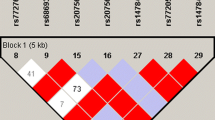Abstract
In male, the prostate cancer (PCa) is one of the most frequent neoplasias and the second cause of cancer deaths worldwide. In 2015, more than 6000 men died in Mexico due to this disease. In this regard, prostate cancer associated gene 3 (PCA3) has become an interesting target in PCa as is found highly overexpressed. Moreover, TAAA tandem repeats have been suggested to be associated with the regulation of PCA3 expression and, in turn, to be related with the development of the disease. The aim of the study was to understand the genetic basis of the disease in search for a better diagnosis. Expression levels of PCA3 gene were analysed in tissue of 13 patients diagnosed with PCa and six patients diagnosed with a benign prostatic disease (BPD). The absolute expression of PCA3 was quantified by real-time PCR. Genotype for TAAA tandem repeats was measured using automatic sequencing and the results were analysed to determine whether an association existed between them. We identified three alleles: 4, 5, 6 and four genotypes: 4/5, 5/5, 5/6, 6/6. Our analysis identified a mutation in the nucleotide 76764237 of the PCA3 gene that generates an extra TAAA tandem repeat. The nucleotide mutation is present in 61.53% of PCa and 66.66% of BPD patients. Our study revealed the presence of a mutation in the PCA3 gene that generates an extra TAAA tandem. We observed no association between the absolute expression of PCA3 messenger and the number of TAAA repetitions.


Similar content being viewed by others
References
Berger A., Klocker H., Niescher M., Bektie J., Pelzer A., Bartsch G. et al. 2005 Prostate cancer detection rates in the low and intermediate PSA range. Eur. Urol. 4, 597.
Bussemakers M. J., Van Bokhoven A., Verhaegh G. W., Smit F. P., Herbert F. M. Schalken J. A. et al. 1999 DD3: a new prostate-specific gene, highly overexpressed in prostate cancer. Cancer Res. 59, 5975–5979.
Elabbady A. A. and Kherd M. M. 2006 Free/total PSA ratio can help in the prediction of high gleason score prostate. Int. Urol. Nephrol. 38, 553–557.
Gustincich S., Manfioletti G., Del Sal G., Schneider C. and Carninci P. 1991 A fast method for high-quality genomic DNA extraction from whole human blood. Biotechniques 11, 298–300.
INEGI 2016 Instituto Nacional de Estadística y Geografía web-based platform, (https://www.inegi.org.mx/app/tabulados/interactivos/default?px=Mortalidad_06&bd=Mortalidad) accesed July 2019.
Marks L. and Bostwick D. 2008 Prostate cancer specificity of PCA3 gene testing: examples from clinical practice. Rev. Urol. 10, 175–181.
Marks L. S., Fradet Y., Deras I. L., Blase A., Mathis J., Aubin S. M. et al. 2007 PCA3 Molecular urine assay for prostate cancer in men undergoing repeat biopsy. Urology 69, 532–535.
Neves A. F., Dias J. D., Araújo T. G., Marangoni K. and Goulart L. R. 2013 Prostate cancer antigen 3 (PCA3) RNA detection in blood and tissue samples for prostate cancer diagnosis. Clin. Chem. Lab Med. 51, 881–887.
Rangel H., Muñoz J. F., González A., Gorostiza A., Magaña M. T. and Paéz L. A. 2008 Genetic admixture, relatedness, and structure patterns among Mexican populations revealed by the Y-chromosome. Am. J. Phys. Anthropol. 135, 448–461.
Rubí R., Martínez G., Muñoz J. F., Cerda R. M., Anaya M. and Rangel H. 2009 Pre-Hispanic mesoamerican demography approximates the presentday ancestry of mestizos throughout the territory of Mexico. Am. J. Phys. Anthropol. 139, 284–294.
Silva I., Hidalgo A., Estrada J., Fernández J. C., Uribe L., Contreras A. et al. 2009 Analysis of genomic diversity in Mexican mestizo populations to develop genomic medicine in Mexico. Proc. Natl. Acad. Sci. USA 106, 8611–8616.
Tao Z., Shen M., Zheng Y., Mao X., Chen Z., Yin Y. et al. 2010 PCA3 gene expression in prostate cancer tissue in a Chinese population: Quantification by real-time FQ-RT-PCR based on exon 3 of PCA3. Exp. Mol. Pathol. 89, 58–62.
Torre L. A., Bray F., Siegel R. L., Ferlay J., Lortet-Tieulent J. and Jemal A. 2015 Global cancer statistics, 2012. CA Cancer J. Clin. 65, 87–108.
Verhaegh G. W., Van Bokhoven A., Smit F., Schalken J. A. and Bussemakers M. J. 2000 Isolation and characterization of the promoter of the human prostate cancer specific DD3 gene. J. Biol. Chem. 275, 37496–37503.
Zhou W., Chen Z., Hu W., Shen M., Zhang X., Li C. et al. 2011 Association of short tandem repeat polymorphism in the promoter of prostate cancer antigen 3 gene with the risk of prostate cancer. PLoS One 6, 1–4.
Zhou W., Tao Z., Wang Z., Hu W., Shen M., Zhou L. et al. 2014 Long noncoding RNA PCA3 gene promoter region is related to the risk of prostate cancer on Chinese males. Exp. Mol. Pathol. 97, 550–553.
Acknowledgements
This work was supported by Universidad Politécnica de Sinaloa. We thank Fernando Antonio Bergez Hernández, Alejandra Paola Martínez Camberos, Saúl Armando Beltrán Ontiveros and Dr Geovanni Romero Quintana for their support. Special thanks to Erubiel Borboa García for the support with the images.
Author information
Authors and Affiliations
Corresponding author
Additional information
Corresponding editor: H. A. Ranganath
Rights and permissions
About this article
Cite this article
ARÁMBULA-MERAZ, E., IRIGOYEN-ARREDONDO, M., CEDANO-PRIETO, D. et al. Promoter polymorphisms of the PCA3 gene are not associated with its overexpression in prostate cancer patients. J Genet 99, 51 (2020). https://doi.org/10.1007/s12041-020-01202-0
Received:
Revised:
Accepted:
Published:
DOI: https://doi.org/10.1007/s12041-020-01202-0




